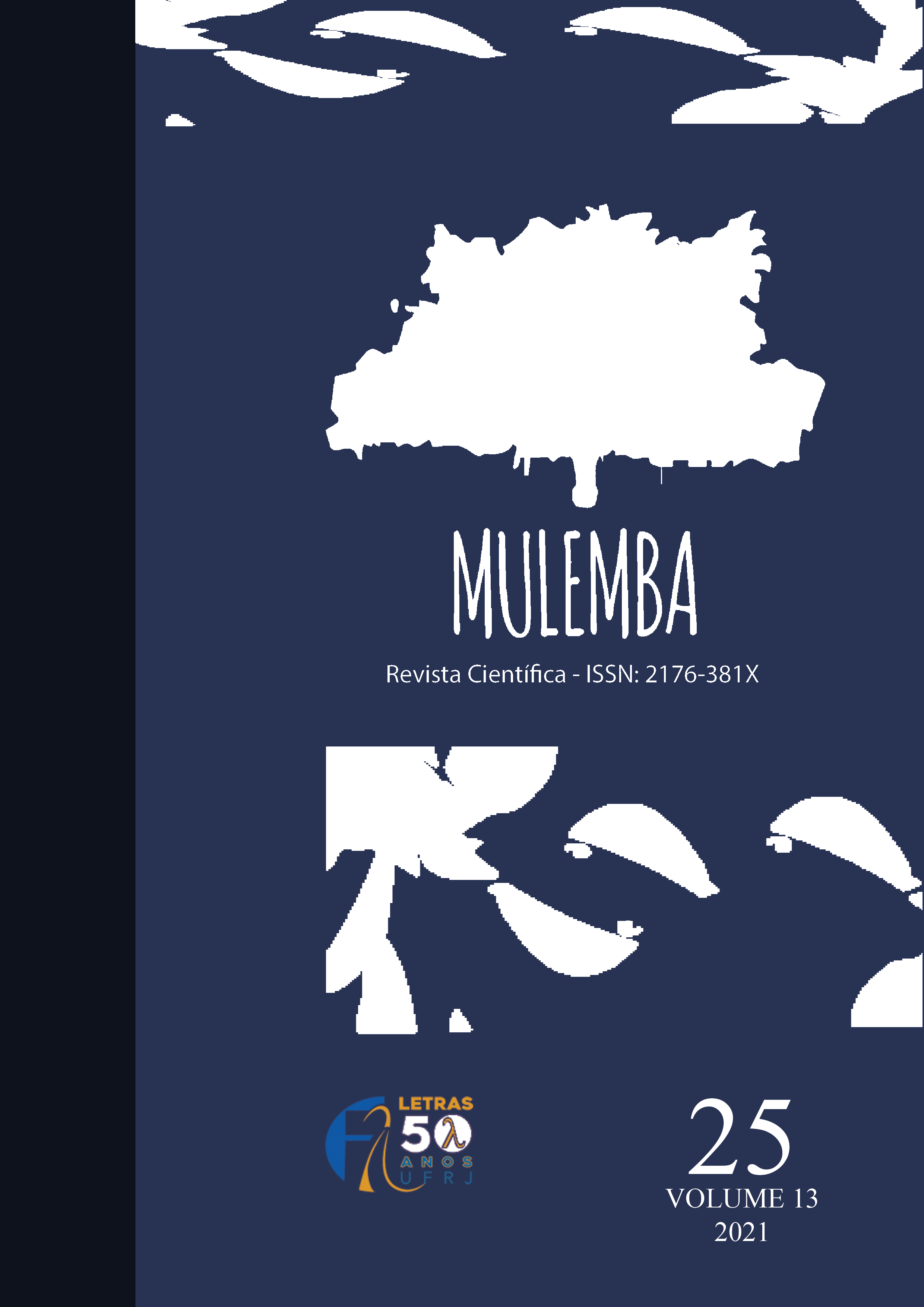Negritude e Pan-africanismo da <i>Présence Africaine</i> à <i>Mensagem</i>: um roteiro da circulação de ideias e impressos (depois de 1945)
DOI:
https://doi.org/10.35520/mulemba.2021.v13n25a51451Abstract
Neste texto, traça-se um dos roteiros possíveis da circulação das ideias negritudinistas e pan-africanistas e dos impressos que as veiculavam entre a África e a Europa depois da Segunda Guerra Mundial. Destacar-se-á o papel das revistas Présence Africaine e Mensagem por entender-se que tais revistas foram representativas dos contrastes e tensões da época, assim como das disparidades geradas pela dominação colonial e as suas consequências em âmbito de produção e fruição cultural.Downloads
Riferimenti bibliografici
AAVV. Cultura. Luanda: Sociedade Cultural de Angola, nº 5, ano 1, Setembro de 1957.
AAVV. Mensagem. Lisboa: CEI. Ano III, nº 5/6.
AAVV. Mensagem. A Casa do Estudantes do Império (1944-94). Número especial.
Lisboa: UCCLA, 1994.
AAVV. Nouvelle somme de poésie du monde noir. Présence Africaine: 1966/1 (N° 57).
ABRANCHES, Henrique. Panorama das línguas. Cultura. Luanda: Sociedade Cultural de Angola, ano 1, nº 4, 1957.
ADI, Hakim. Pan-Africanism, a history. New York-London: Bloomsbury Academic, 2018.
ANDRADE, Mário Pinto De (org). Antologia da Poesia Negra de Expressão Portuguesa. Paris: Pierre Jean Oswald, 1958.
AZOULAY, Ariella Aïsha. Potential History. Unlearning imperialism. London – New York: Verso, 2019.
BOLAMBA, Antoine-Roger. Esanzo, chants pour mon pays. Paris: Présence Africaine, 1995.
BOUKARI-YABARA, Amzat. Africa Unite! Une histoire du panafricanisme. Paris: La Découverte, 2014.
CARDOSO, António. Poesia ou poesia em Angola. Cultura, Sociedade Cultural de Angola: Luanda, ano 1, nº 2-3, 1957.
CÉSAIRE, Aimé. Discours sur le colonialisme. Paris: Présence Africaine, 1955.
CHAKRABARTY, Dipesh. Provincializing Europe: postcolonial thought and historical difference, Woodstock: Princeton University Press, 2000.
COOPER, Frederick. Histórias de África. Capitalismo, Modernidade e globalização. Lisboa: Edições 70, 2016.
CRUZ, Viriato da. Des responsabilités de l’ intellectuel noir. Présence Africaine: Paris, nº 4-5, 1959, 321-339.
FANON, Frantz. Les damnés de la terre. Paris: Maspero, 1961.
TENREIRO, Francisco José Tenreiro; ANDRADE, Mário Pinto De (org). Caderno de Poesia Negra de Expressão Portuguesa. Lisboa: Editora Gráfica Portuguesa, Abril de 1953.
HARBI, Mohamed. La guerre coloniale a commencé à Sétif. Le Monde Diplomatique: Paris: p. 21, Outubro de 2005.
JAMES, C.L.R. The Black Jacobins: Toussaint Louverture and the San Domingo Revolution. London: Secker and Warburg, 1938.
LUBABU, Tshitenge M.K. Naissance du Rassemblement démocratique africain. Jeune Afrique. 15/10/2007.
MARTINS. Hélder. Casa dos Estudantes do Império. Subsídios para a História do seu período mais decisivo (1953 a 1961). Lisboa: Caminho, 2017.
MBEMBE, Achille, The power of the archive and its limits. Cape Town: David Philip Publishers, 2002.
MOURALIS, Bernard. «Présence Africaine: Geography of an “Ideology”», in V.Y. Mudimbe (org), Valentin Yves (org). The Surreptitious Speech Presence Africaine and the Politics of Otherness 1947-1987. Chicago – London: The University of Chicago Press, 1992.
MOURÃO, Fernando. Antologia da Poesia Negra de Expressão Portuguesa, por Mário de Andrade. Mensagem. Lisboa, ano III, número 1, 9 -10 Janeiro de 1960.
MUDIMBE, Valentin Yves (org). The Surreptitious Speech Presence Africaine and the Politics of Otherness 1947-1987. Chicago – London: The University of Chicago Press, 1992.
NDIAYE, Pap. Présence africaine avant «Présence Africaine». La subjectivation politique noire en France dans l’entre-deux-guerres. Revue d’Anthropologie et d’histoire des arts. p. 64-79, 2009 https://doi.org/10.4000/gradhiva.1517
NETO, Agostinho. Introdução a um colóquio sobre POESIA ANGOLANA. Cultura. Lisboa: Ano III, nº 5/6, págs 45 -51, 1960.
OLIVEIRA, Mário António de. Uma vasta zona de mestiçagem cultural. Mensagem. Lisboa: CEI, p. 41-42, 1962.
PADMORE, George. Panafricanism or Communism. The coming struggles for Africa. New York: Roy Publishers, 1956.
QUIJANO, Aníbal. Ensayos em torno a la colonialidad del poder. Buenos Aires: Ediciones del Signo, 2019.
ROBINSON, Cedric. Black marxism: the making of the Black radical tradition. Londres: Zed Press, 1983.
SHARPLEY-WHITING, T. Denean. Negritude Women. Minneapolis: University of Minnesota Press, 2002.
SILVEIRA, Onésimo. África ao Sul do Sahara: Sistemas de Partidos e Ideologias de Socialismo. Viseu: Associação Académica África Debate, 2004.
SOUDIECK DIONE, Maurice. Les impasses épistémologiques autour de l’object Afrique. MBEMBE, Achille; SARR, Felwine (org). Écrire l’Afrique-Monde. Paris: Philippe Rey, Dakar: Jimsaan, p. 119 - 133, 2017.
STOLER, Ann Laura. Along the archival grain. Epistemic Anxieties and Colonial Common Sense. Princeton: Princeton University Press, 2009.
TROUILLOT, Michel-Rolph. Silencing the past. Power and the production of history. Boston: Beacon Press, 1995.
TRÜPER, Henning, CHAKRABARTY, Dipesh, SUBRAHMANYAM, Sanjay (org). Historical Teleology in the Modern World. London, New Delhi, New York, Sidney: Bloomsbury, 2015.
VARELA, Pedro; PEREIRA, José Augusto. As origens do movimento negro em Portugal (1911-1933): uma geração pan-africanista e antirracista. Rev. Hist. São Paulo, n.179, a04119, 2017. http://dx.doi.org/10.11606/issn.2316-9141.rh.2020.159242
##submission.downloads##
Pubblicato
Fascicolo
Sezione
Licenza
Autores que publicam nesta revista concordam com os seguintes termos:
- Autores mantém os direitos autorais e concedem à revista o direito de primeira publicação, com o trabalho simultaneamente licenciado sob a Licença Creative Commons Attribution que permite o compartilhamento do trabalho com reconhecimento da autoria e publicação inicial nesta revista.
- Autores têm autorização para assumir contratos adicionais separadamente, para distribuição não-exclusiva da versão do trabalho publicada nesta revista (ex.: publicar em repositório institucional ou como capítulo de livro), com reconhecimento de autoria e publicação inicial nesta revista.
- Autores têm permissão e são estimulados a publicar e distribuir seu trabalho online (ex.: em repositórios institucionais ou na sua página pessoal) a qualquer ponto antes ou durante o processo editorial, já que isso pode gerar alterações produtivas, bem como aumentar o impacto e a citação do trabalho publicado (Veja O Efeito do Acesso Livre).

